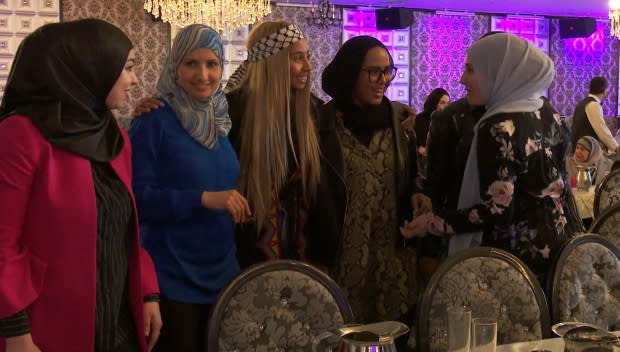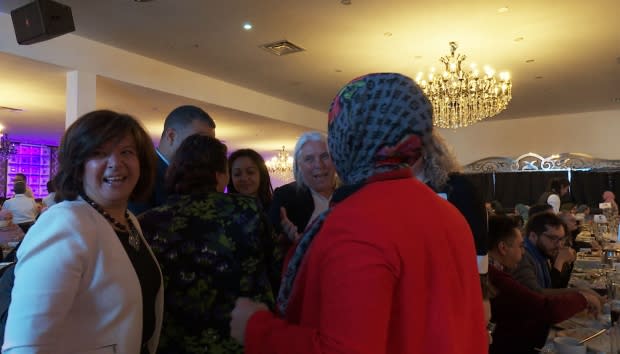At the mall, on the bus: Muslim women say racist incidents are now part of daily life
Manalle Abdallah paused at the end of each word as she said it.
"He spat on each of us."
Abdallah and a friend had been having a "girls' day" at the Rockland Centre shopping mall in Town of Mount Royal about a month ago.
They were standing in line for ice cream at Laura Secord when the man behind them all of a sudden said "that we should go back to our home country."
When Abdallah recalled the moment her eyes went wide, her voice rose and with an incredulous laugh she added: "Which is Canada!"
The young women ignored him — as their parents taught them to do; not to escalate, to "be the bigger person."
Then, he did it. The man looked them both in the eyes and spat once, twice.
Abdallah, a bubbly 23-year-old, said she and her friend stood there in shock as the man walked away.
"I could tell you a thousand things I would have been able to do, but I was so — I couldn't believe I was actually experiencing it."
What happened to Abdallah and her friend, advocates say, is part of a rash of incidents of harassment and even assault on Muslim women since the Coalition Avenir Québec government tabled Bill 21 in late March.

Just last week, CBC reported how a 22-year-old woman, Fatima Ahmad, was pushed by a man who also pulled at her niqab. That incident happened at Charlevoix Metro, and Ahmad recounted running after the man and snapping a picture. She reported it to police.
The bill, Quebec's proposed secularism law, aims to ban certain groups of public sector workers, including teachers, lawyers and police officers, from wearing religious symbols.
University group found no benefits to bill
Critics say the bill would impede people's right to practice their religion, divide Quebecers and exclude minorities from public service — disproportionately so for Muslim women who wear a headscarf.
But the incidents raised by advocates suggest the government's very introduction of the bill is already causing harm that extends well beyond the public sphere and into daily lives.
Justice Femme, a Montreal organization that offers legal and psychological support to women, says it has received more than 40 calls from women who wear the hijab since Bill 21 was introduced.
The organization submitted a summary of its findings last week to elected officials studying the bill.
A university group researching the relationships between immigration and society, SHERPA, which falls under the CIUSSS Centre-Ouest-de-l'Île-de-Montréal health authority, has released findings about the bill's potential impacts.
It said it could find no evidence that this type of debate has any benefits, but that several studies show it has negative effects on public health.
In Quebec, it found that debates around "religious accommodations" increased violence between ethnic groups in schoolyards between 2013 and 2017, and Quebecers of Haitian and Arabic descent felt an increase in discrimination between 1998 and 2007.
Hate crimes have been on the rise, too, according to SHERPA's research.
The result is more social tension, less social integration and serious psychological distress and depression for minorities, according to the group.
If the government is to go ahead with the bill, the group wrote, "we recommend a close monitoring of intergroup relations, discrimination and hate crimes associated to the present social context."
Yelled at on public transit
If Bill 21 is adopted, Mariam Hoblos's teaching career would be directly affected. But even now, with the bill working its way through the National Assembly, she says she can feel its effects.
On a recent daily commute, coming off the bus at Crémazie Metro, a man yelled obscenities in her ear that she did not want to repeat.
It is a particular kind of pain, Hoblos said, to feel hated by someone you don't know. "He had no right to do what he did."

Hoblos is 23 years old and wears a hijab. She is one internship away from completing her degree in education at Université de Montréal. Right now, she has a gig teaching first grade.
Bill 21 would effectively bar her from becoming a teacher in the province where she was born.
"Teaching is my passion, before even being work. It's something I love to do, to educate a new generation, so it's really sad," Hoblos said.
Being yelled at by a stranger for something Hoblos sees as part of herself, her hijab, was jarring and painful. But a defiant smile grew on her face when she recalled her reaction.
"I turned around, but I said to myself, is it really worth it to respond to ignorant people? And I thought, no, too bad for him, he can stay ignorant. I'm going to continue on my way and do what I have to do."
She believes the man felt emboldened by the bill, as though it had opened a door for him to approach her. Just as it may have closed one on her teaching in Quebec, at least while the CAQ is in power.
"There are other provinces that want to welcome us. I wouldn't mind leaving," she said.
Would she take her hijab off to stay? "Never." Hoblos smiled again. "Never."
Abdallah and Hoblos spoke to CBC at an Iftar, the dinner that ends the daily fast during Ramadan. In this case, it was also a yearly fundraiser for the Canadian Muslim Forum in Laval on Montreal's North Shore.
Some have pointed to the irony of the CAQ holding its hearings on Bill 21 — which it has vowed to use the notwithstanding clause to pass regardless of the outcome of those hearings — during the Muslim month of fasting.
Abdallah doesn't often wear a hijab, usually opting to put one on for special occasions and family events. Sometimes she just wants to wear one as a way of embracing her culture.
She wasn't wearing one that day at the mall but her friend was. She, too, believes the man who assaulted them felt he could do so because of Bill 21.

The incident made Abdallah sad, but she says it also felt "like reality was put in front of my face," adding that "there's an adrenaline rush in me to fight against it."
Not physically, but through hearts and minds, through advocacy, Abdallah said.
Abdallah was born in Montreal. Her parents are from Egypt. Both places are part of her identity, she says.
She graduated with a degree in social work from McGill University last summer. She is also a fashion model and travels between Montreal and California.
Describing herself, she says, "I'm pretty close to my family. I can get super loud, like I can get shy."
She wants Quebecers to get to know Muslims, to meet one, to understand their multiplicities, like hers, like everyone's.
Sarah Abou-bakr, who's the same age as Abdallah and Hoblos, was at the dinner too, mingling throughout the ballroom-style restaurant.
Though her two contemporaries did not report their incidents to authorities, it's something Abou-bakr is trying to get more women to do.

Since the bill was tabled, she said, she's been accompanying women to make police complaints every week.
One involved a stranger taking a photo of a woman in a niqab and her children, and posting it to social media with hateful comments.
Another woman she accompanied cried when Abou-bakr told her, "I'll be there for you, but this is your situation. I want you to speak up."
The woman was scared of doing that, Abou-bakr said, because Muslim women who experience harassment "don't know who to trust anymore, when your own government is dictating what not to wear … and making you feel like you're not like the rest of society."
'A bit of joy in a large bucket of sadness'
At the beginning of the Iftar, a man sang into a microphone on the stage. At one point during the singing, waiters emerged with platters full of food and poured water, and Jallab, a sweet and fragrant drink with slices of almond, into people's glasses.
It had been more than 12 hours since most of the people in the room had ingested anything.

First, they took big gulps, then big bites. The relief was palpable. Some got up to pray, others joined acquaintances at other tables.
A gaggle of friends laughed with Québec Solidaire co-spokesperson Manon Massé. Nearby, Conservative senator Jean-Guy Dagenais chatted with the person sitting next to him.
Abdallah described the evening as "a bit of joy in a large bucket of sadness."
She looks forward to Iftar dinners during the rest of the year.
"It's such a pleasant month. You come home, everybody's home, everybody eats together," she said.
"In our culture, we're very generous people and we're all about family, being together," she said. "For people that are against us, I feel like they should look at that as an example — like, we're really peaceful people!"

